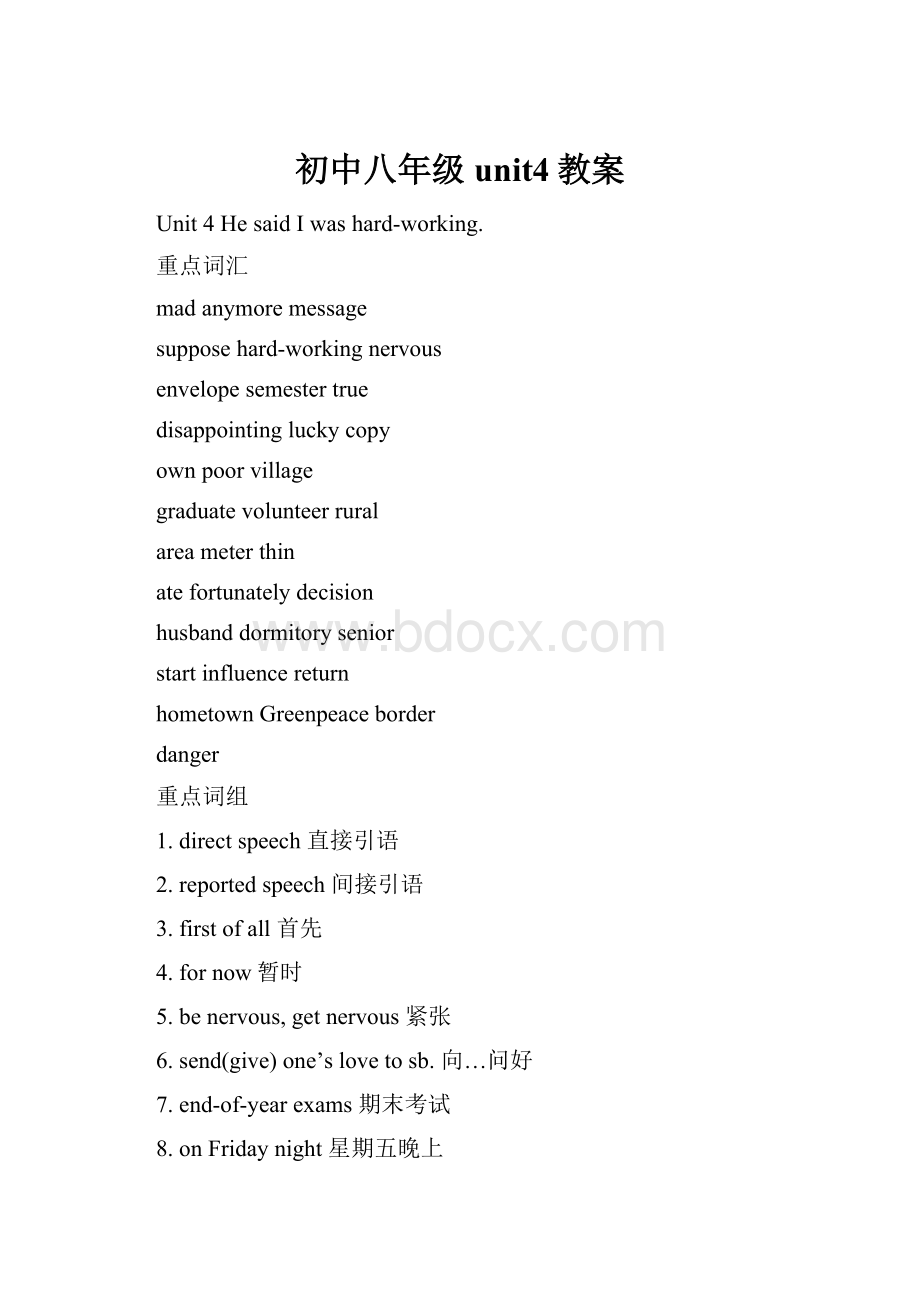初中八年级unit4教案.docx
《初中八年级unit4教案.docx》由会员分享,可在线阅读,更多相关《初中八年级unit4教案.docx(14页珍藏版)》请在冰豆网上搜索。

初中八年级unit4教案
Unit4HesaidIwashard-working.
重点词汇
madanymoremessage
supposehard-workingnervous
envelopesemestertrue
disappointingluckycopy
ownpoorvillage
graduatevolunteerrural
areameterthin
atefortunatelydecision
husbanddormitorysenior
startinfluencereturn
hometownGreenpeaceborder
danger
重点词组
1.directspeech直接引语
2.reportedspeech间接引语
3.firstofall首先
4.fornow暂时
5.benervous,getnervous紧张
6.send(give)one’slovetosb.向…问好
7.end-of-yearexams期末考试
8.onFridaynight星期五晚上
9.be(get)madat=beangrywith生…气
10.workon(at)致力于
11.passon…to传递…给
12.not…anymore=nomore不再
13.begoodat=dowellin擅长于
14.besupposedto被期望或被要求
15.ingoodhealth身体健康
15.reportcard成绩单
16.takeamessage捎口信
真的不掉线吗?
?
、?
?
?
?
?
?
?
?
?
?
?
?
17.inapoormountainvillage在贫困山区
18.ruralareas落后地区
19.threetimesaday一天三次
20.haveasurpriseparty悄悄举行一个聚会
21.I’msorrytohearthat…听到…难过
22.makemoney赚钱
23.losemoney亏钱
24.seniorhighschool高级中学
25.inthecityof…在…市
26.inpoorcountries贫困国家
27.workas…作为…工作
28.inthechildren’slives在孩子们的一生中
29.indanger处于危险中
30.in(on)thesoapopera在肥皂剧里
31.tellsb.todosth.告诉…做…
32.tellsb.nottodosth.告诉…不要做…
33.haveabigfight大吵一架
34.onbusiness因公事
38.pretendtodosth.假装做
39.dobetter有待提高,做得更好
40.copyone’shomework抄…作业
41.sickpeople病人
42.tellthetruth讲真话(实话)
43.tellalie说谎
44.Howisitgoing?
情况怎样(你好吗)?
45.getover克服,恢复,原谅
46.theMinistry教育部
47.ChineseYoungPioneer中国少年先锋队
48.sealevel海平线
49.openup打开
50.carefor照料,照顾
51.ahomeworkproject家庭作业
52.besurprisedtodosth.做…感到惊讶
53.haveahardtime艰难的时候
真的不掉线吗?
?
、?
?
?
?
?
?
?
?
?
?
?
?
54.PekingUniversity北京大学
55.UNICEF(=UnitedNationsInternationalChildern’sEmergencyFund)联合国儿童基金会
56.WWF(=WorldWildlifeFund)世界野生动物基金会
重点句子
1.Whataresomesoapoperasyouknow?
你知道哪些肥皂剧?
a.此句是一个含有定语从句的复合句,youknow(前面省略了关系代词that)是定语从句,修饰先行词soapoperas.Mr.Brownistherightmanthatfitsthejobs.
b.Some在此句中为形容词,表示一些不确定的数量,一般来说,some用于肯定句,any用于否定句或疑问句,但当说话者想得到对方的肯定回答时,要用some.
Wouldyoulikesomewater?
--Yes,please.
2.Doyoueverwatchsoapoperas?
你曾看过肥皂剧吗?
ever(一般用于疑问句)表示“曾,曾经”
HaveyoueverbeentoBeijing?
3.I’mmadatMarcia.
madadj.生气的;气愤的构成结构:
bemadatsb.意为“生某人的气”也可用bemadwithsb.
eg:
我妈妈很生我的气,因为我没有完成家庭作业。
Mymotheris____________mebecauseIdidn’tfinishmyhomework.
4.ShesaidshewashavingasurprisepartyforLanaonFridaynight.
她说她星期五晚上要为拉娜举办一个惊喜晚会。
5.Linathinksshe’scomingtomyhousetostudy.拉娜想她要到我家来学习。
Becoming是现在进行时表示将来的意义。
英语中,come,go,leave等词的现在进行时可表示将来。
TheNo.3busiscoming.3路车要过来了。
6.Linasaidshewasn’tmadatMarciaanymore.
Anymore用于疑问句,意为“再,还”;用于否定句,相当于anymore,侧重于今后不再。
Hedoesn’tcomehereanymore.
辨析:
not…anymore=not…anymore=nomore“不再”,多用于数量和程度上的不再,多于瞬间性动词连用。
Thebabydidn’tcryanymore=Thebabynomorecried.
Not…anylonger=nolonger不再,多用于时间上的不再,多于延续性动词连用。
Hedidn’tlivehereanylonger=Henolongerlivedhere.
7.Youaresupposedtomeetatthebusstoptoreturnit.
returnv.“归还”相当于giveback
真的不掉线吗?
?
、?
?
?
?
?
?
?
?
?
?
?
?
短语:
换给某人某物returnsb.sth.=givesth.backtosb.
supposev.假定;认为;期望
短语:
besupposedtodosth.=shoulddosth.“应该、理应或必须做某事“
benotsupposedtodosth.=shouldn’tdosth.“不被许可或不应当做某事’
eg:
Lucywassupposedtocometolunch.What’shappened?
露西本该来吃午饭。
出什么事了。
Youarenotsupposedtoplayfootballintheclassroom.在教室里是不允许踢足球的。
8.YouwantJimtopassthismessagetoAnn.
Passv.传递passsth.tosb.=passsb.sth.把某物传给/递给某人。
Passthepapertome,please.请把纸递给我。
message是可数名词,“消息,信息”
Hereisamessageforyou.这儿有你的信息。
message的常用搭配
giveamessagetosb.给某人捎个信儿awrittenmessage书面通知
leaveamessageforsb.给某人留个信儿receiveamessagefromsb.收到某人的信息
sendamessagetosb.给某人发个信息
9.I’mgoodatspeaking,
begoodat擅长…,在…方面做得好begoodfor对…有益,bebadfor对…有害
辨析:
begoodat较笼统地指某一方面有特长、很优秀。
Heisgoodatmaths,buthedidn’tdowellinthelastexam.
dowellin特指某一次活动或某一件事情中做得好或做得出色或指学校功课、成绩好
TomdidverywellinthatEnglishteat.
10.Ihadareallyhardtimewithsciencethissemester…
这学期我的科学课确实学得很吃力…
Haveahardtimewithsth./doingsth.意为“做某事费了好大的劲”
Thenewteacherhadahardtimewiththenaughtyboys.
Ihadahardtimepassingmymathexam.
11.Everyyeartheysend100volunteerstoteachinChina’sruralareas.
每年他们派100名志愿者到中国偏远的地区去支教。
send表示“派,送,寄”
sendsb.todosth.派某人做某事
Manyparentswanttosendtheirchildrentostudyabroad.
真的不掉线吗?
?
、?
?
?
?
?
?
?
?
?
?
?
?
sendfor派人去请,派人去叫
Heisill;pleasesendforadoctor.
sendaway撵走,开除
Thebosssenthimaway.
sendup发射
Man-madesatelliteshavebeensentupintospacebymanycountries.
12.Hervillagewas2000metersabovesealevel,andatfirstthethinairmadeherfeelsick.
她所在的村庄在海拔2000米。
起初,稀薄的空气让她感到恶心。
above在…之上,超过,仅表示位置关系,不直接接触另一物,反义词,below
Wewereflyingabovetheclouds.
on在上边(表面接触),反义词beneath
Thereisaneraseronthedesk.
over在…正上方,指一个物体在另一个物体的垂直上方
Thereisabridgeovertheriver.
辨析:
atfirst相当于atthebeginning,表示“当初,起初”与后来发生的事向对照
AtfirstIdidn’twanttogo,butIsoonchangedmymind.
firstofall表示“首先,最重要的”,说明顺序,是时间上或一系列行动的开始,后面往往接next,then等。
Firstofall,openthewindows,thenturnoffthegas.
13.Caresforwildanimalsindanger关注濒危的野生动物
carefor“照料,照顾”,同义词:
takecareof/lookafter
dangern.危险,威胁;indanger“处于危险之中”。
反义词:
outofdanger“脱离危险”
Someanimalsareindanger.
语法:
直接引语和间接引语
(一)直接引语的特点
(1)被引用的话放在引号内;
(2)被引用的话是原话,不做任何改动;
(3)引用的话之前用“,”;
(4)引用的话结束后,需用“.”、“!
”、“?
”等标点符号;
(5)引出直接引语的引述动词常为:
say(说道),ask(问道),shout(喊道),cry(喊道),order(命令),add(补充道),smile(微笑道),laugh(大笑道),等
“Marywillgivemeanicepresent,”Bobbiesaid.博比说:
“玛丽要给我一件精美的礼物。
”
真的不掉线吗?
?
、?
?
?
?
?
?
?
?
?
?
?
?
Lisaasked,“Cansomeonehelpme?
”丽莎问:
“有人能帮我吗?
”
Davidsaidtome,“Ihavebeenillsincelastweek.”大卫对我说:
“自上周以来,我一直生病。
”
Thegirlsmiled,“I’mdelightedtoseeyouagain.”姑娘微笑道:
“我很高兴再次见到你。
”
(二)间接引语的特点
(1)在引述谓语和被引用的话语之间不用逗号、冒号、引号等;
(2)有时态的变化;
(3)有人称、时间、地点等的变化;
(4)常用的引述动词:
say(说道),ask(问道),shout(喊道),cry(喊道),order(命令),add(补充道),smile(微笑道),laugh(大笑道),等
MillsaidthathewouldstayinChinaforanotheryear.米尔说,他将在中国再待一年。
Lilytoldmethatshehadphonedyou.莉莉告诉我,她给你打过电话。
ThegirlaskedmeifIcouldhelpher小姑娘问我,是否能帮他。
TomaskedJimwhentheywouldstartoff.汤姆问吉姆,他们什么时候出发。
(三)直接引语变间接引语的方法
1.从句人称的变化
由直接引语变间接引语时,从句的主语人称要遵循一主、二宾、三不变的原则。
1)直接引语的主语是第一人称时,变为间接引语时要和主句的主语保持一致。
eg:
①Theysaid,“Wewillgotherebybus”
他们说“我们将乘公共汽车去那儿”。
→Theysaidtheywouldgotherebybus.
他们说他们将乘公共汽车去那儿。
②Hesaid,“Iamvisitingmyauntnextweek.”
→Hesaidthathewasvisitinghisauntnextweek.
③Lileisaid,“IlikeEnglishverymuch.”
→Lileisaid(that)shelikedEnglishverymuch.
④Georgesaid,“Theredcarismine.”
→Georgesaid(that)theredcarwashis.
2)如果直接引语的主语是第二人称,变为间接引语时要与主句的宾语保持一致。
eg:
①Shesaidtome,“Areyouinterestedinscience?
”
她对我说:
“你对自然科学感兴趣吗?
”
→Sheaskedmeif/whetherIwasinterestedinscience.
她真的不掉线吗?
?
、?
?
?
?
?
?
?
?
?
?
?
?
问我是否对自然科学感兴趣。
②Hesaidtome,“Youarehard-working.”
→HetoldmethatIwashard-working.
③Iaskedhim,“Willyoustayathomeorgotoschool?
”
→Iaskedhimif/whetherhewouldstayathomeorgotoschool.
3)如果直接引语的主语是第三人称时,变为间接引语时人称保持不变。
eg:
①Hismothersaidtome,“Hecan’tgotoschool.”
他的妈妈对我说:
“他不能去上学”。
→Hismothertoldmethathecouldn’tgotoschool.
他妈妈告诉我他不能去上学了。
②Theteachersaid,“Theystudiedveryhard.”
→Theteachersaid(that)theystudiedveryhard.
2. 从句时态的变化
1)如果主句是一般现在时或一般将来时,直接引语变间接引语时,从句的时态保持不变。
eg:
Hesays,“Iamvisitingmyauntnextweek.”
他说:
“我下周要去看望我的姑姑”。
→Hesaysthatheisvisitinghisauntnextweek.
2)如果主句的时态为一般过去时,从句的时态要做相应的变化(相应的向前推一个时态)。
①一般现在时改为一般过去时;
②现在进行时改为过去进行时;
③一般将来时改为过去将来时。
Tinasaid,“Iusuallygetupatsix.”→Tinasaidsheusuallygotupatsix.
Ninatoldme,“Lisaisstudyingabroad.”→Ninatoldmethatshewasstudyingabroad.
Lilysaidtome,“Iwillseeyouatthesameplacetomorrow.”
→Lilysaidtomethatshewouldseemeatthesameplacethenextday.
注意:
如果直接引语为客观真理、客观事实、自然现象、名言时,变为间接引语时,时态不做变化。
eg:
Theteachersaidtous,“Lighttravelsfasterthansound”.
老师告诉我们:
“光传播的速度要比声音传播的速度要快”。
→TheteachertoldusthatLighttravelsfasterthansound.
Ourteachersaid,“AllworknoplaymakesJackadullboy.”
→OurteachertoldusthatallworknoplaymakesJackadullboy.
我们老师告诉我们,只顾学习不休息,聪明孩子也变傻。
注:
真的不掉线吗?
?
、?
?
?
?
?
?
?
?
?
?
?
?
直接引语
间接引语
一般现在时
一般过去时
现在进行时
过去进行时
一般将来时
过去将来时
一般过去时
过去完成时
现在完成时
过去完成时
过去完成时
过去完成时
3.指示代词的变化
直接引语中的this在变为间接引语时应改为that,these改为those.
Tobysaidtome,“ThisistheSchoolComputerCentre.”
→TobysaidtomethatwastheSchoolComputerCentre.
4. 句型的变化
1)如果直接引语是陈述句,变为间接引语时要用that来引导,that可省略。
主句引述动词主要为:
say(说),tell(告诉),repeat(重复),answer(答到),reply(答复),explain(解释说),think(认为),believe(相信,认为),suggest(建议),advise(建议).
eg:
Hesaid,“IlikewatchingTV.”他说:
“我喜欢看电视”。
→HesaidthathelikedwatchingTV.
2)如果直接引语是一般疑问句,变为间接引语时,需用if或whether来引导,且用陈述句语序。
eg:
Heaskedme,“Willyoubuytheredcoat?
”
他问我:
“你要买那件红外套吗?
”
→Heaskedmeif/whetherIwouldbuytheredcoat.
3)如果直接引语是特殊疑问句,变为间接引语时,引导词就是特殊疑问词,且用陈述句语序。
eg:
Sheaskedme,“Whereareyoufrom?
”
她问:
“你从哪里来的?
”→SheaskedmewhereIwasfrom.
4)如果直接引语是祈使句,变间接引语时,要将祈使句的动词变为不定.原主句引述动词say需改为:
ask(让),tell(告诉),order(命令),beg(乞求),warn(警告),advise(建议)等。
如:
tell(ask,order,…)sb.(not)todosth.
eg:
“Openthedoor.”Theteachersaidtome.
→Theteachertoldmetoopenthedoor.
“Don’topenthedoor.”Theteachersaidtome.
→Theteachertoldmenottoopenthedoor.
5.时间状语的变化
真的不掉线吗?
?
、?
?
?
?
?
?
?
?
?
?
?
?
直接引语
间接引语
now现在
then那时
today今天
thatday那天
thisevening今晚
thatevening那天晚上
yesterday昨天
thedaybefore前天
yesterdaymorning昨天上午
themorningbefore前天早晨
lastnight昨天晚上
thenightbefore前天晚上
twodaysago两天前
twodaysbefore两天前
nextweek下周
thenextweek/thefollowing